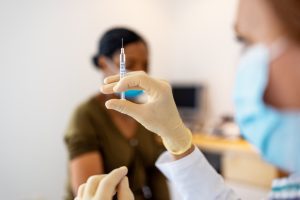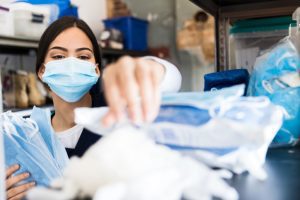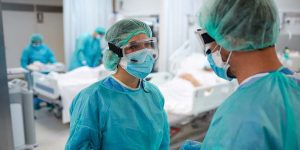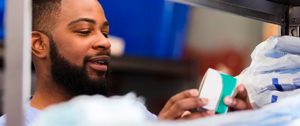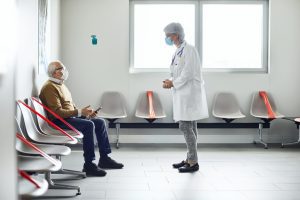To Cathy Harris and her fellow CARE (Controlled Access Restricted Environments) Room teammates, the countless surgical kits they’ve packed aren’t just sterile bundles of tools and technology. They’re people.
She’s not just assembling and quadruple-checking that this carefully packaged arrangement contains exactly what the surgical team expects to have on hand when they perform a procedure. Cathy is also thinking about all the people who could be affected by how well she does this unseen yet critical task.
“Every day when I come to work, my main goal is to get the job done so I can help save another person’s life.”
Cathy Harris
CARE Room Picker/Packer
Owens & Minor
Cathy has been the anxious caregiver—more times than she can count—waiting to hear that a loved one is out of surgery and headed to the recovery room. But of all the care Cathy has given to others, it’s her son’s struggle with type 1 diabetes that stands out the most.
A lifelong athlete, Cathy’s son Dennis recalls how being diagnosed with type 1 diabetes (also referred to as juvenile diabetes) when he was a senior in high school “changed everything” for him. Regardless of how well it’s controlled, type 1 diabetes can affect virtually every organ in the body, as Dennis knows firsthand. Since his initial diagnosis, he has experienced kidney failure, a detached retina, and even had a pancreas transplant, a procedure that has ultimately allowed him to stop taking insulin each day.
After more than a decade working in the CARE Room, Cathy knew that no matter who packed the kits that would be used to perform her son’s surgeries, the surgical team would be relying on someone like her to ensure that the kit was done right. She also knew of the potential consequences if it wasn’t: for example, if an item in the kit was past its expiration date, its sterility could be compromised, or its highly engineered, microscopic components could have degraded.1 In a worst-case scenario, if items are missing from a sterile surgical kit or the right ones are not included, it could possibly delay or derail a patient’s surgery.
Watch the video to learn firsthand from Cathy how her sense of purpose defines her work in the Owens & Minor CARE Room.
Now a teacher, football coach, and ambassador for the American Kidney Fund (AKF), Dennis cites the unwavering support of his mother, his sisters, and especially his wife, Darlene—who gave him one of her kidneys in 2012 after doctors discovered to their astonishment that she was a perfect donor match—as instrumental to supporting his wellbeing. And like his mother, Dennis’ desire to help others has always been evident, from the kids he’s coached to others, whose lives have been affected by a diabetes diagnosis.
“The sense of purpose for me being able to help others definitely came from my mom and everybody feels that when they’re around her,” he says. “My mom is the perfect person for the role that she plays at Owens & Minor because she’s a helper. She wants to help everybody humanly possible.”
To learn more about Owens & Minor’s Purpose and what drives teammates like Cathy to help make each day better for the patients, providers, and communities we serve, visit owens-minor.com/about. To learn more about the CARE Room and SurgiTrack®, visit owens-minor.com/services/surgitrack.



